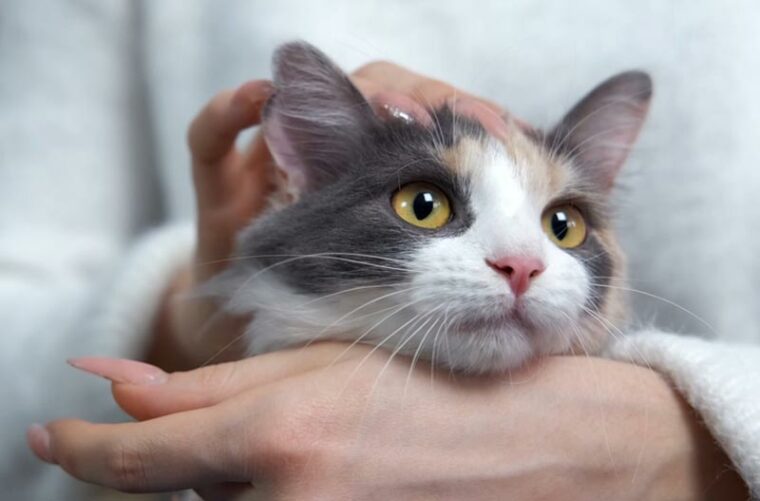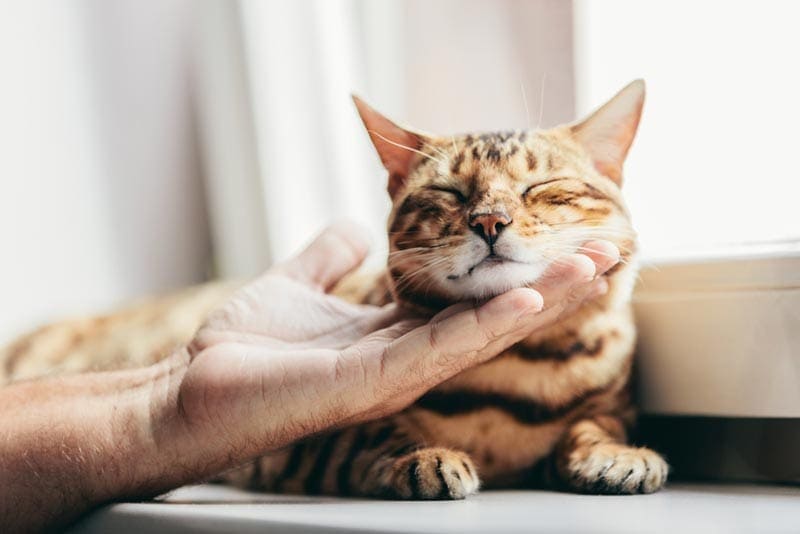
Listening to a cat purr can be incredibly soothing, but is there ever too much of a good thing in this situation? If your cat seems to purr all the time, you might wonder why and whether it’s normal. Cats purr for several reasons, and excessive purring isn’t always normal.
In this article, we’ll tell you why your cat might be purring all the time and why it could be a cause for concern. We’ll also discuss what to do to determine if your cat’s constant purring is normal.
How Do Cats Purr?
The truth about how cats purr hasn’t been entirely determined by science. The sound is produced by the movement of air through the cat’s larynx or voice box. Cats make a purring sound when they both inhale and exhale, unlike a meow, which only occurs on exhalation.
It’s suspected that the cat’s brain triggers the urge to purr, but we have yet to discover precisely how this happens. Besides domestic cats, some wild cat species, such as the lynx and mountain lion, can also purr.

Why Do Cats Purr?
Purring, like meowing and other vocalizations is primarily a way for cats to communicate feelings. It also has another suspected purpose, which could be more concerning.
1. Cats Purr Because They’re Happy
Happiness and contentment are the emotions that humans most commonly associate with a cat purring. And in many cases, this is accurate. If your cat purrs all the time, it could be because they are just a very relaxed and happy kitty.
Purring helps kittens bond with their mothers, and your happy cat may also purr to help form a connection with you. This type of purring is normal and shouldn’t be a cause for concern.

2. Cats Purr Because They’re Anxious
As confusing as it sounds, cats also purr when stressed or anxious. Cats hospitalized or traveling in the car often purr, even though these are not relaxing situations. The sound of purring serves as a way for the cat to self-soothe.
If your cat is purring all the time, there’s a possibility that something is stressing them out. You may suspect stress purring if something significant recently changed in your house, such as a new baby. If your cat previously didn’t purr often but suddenly seems to do it constantly, it could be due to stress.
3. Cats Purr Because They’re Sick or in Pain
Research into the healing power of sound has determined that vibrations of a specific frequency are beneficial.1 Cats purr at frequencies shown to aid in healing conditions like muscle pain, broken bones, wounds, and swelling. In some circumstances, cats may purr to heal themselves.
If your cat is purring all the time, there’s a chance that they might be injured or sick. In many cases, you’ll probably notice other signs that your cat is unwell, such as weight loss, decreased appetite, or limping. However, because cats have the instinct to hide their weaknesses, it’s also possible that excessive purring could be the only sign that your cat is sick or hurting.

What to Do if Your Cat Is Purring All the Time
So, if your cat is purring all the time, what should you do? We’ve learned that this might be normal behavior but could indicate something is wrong with your pet.
The first step is to rule out any physical cause of your cat’s constant purring. Take your cat to the vet for a check-up and diagnostic tests. Your vet can ensure your cat isn’t suffering a breathing issue that sounds like constant purring, and they will rule out other illnesses or injuries.
If your cat gets a clean bill of health, it’s time to do some investigating of your own. Could something inside or outside your home be stressing your cat out? Depending on your cat’s personality, even something as simple as an out-of-town guest could make them anxious.
Other possible causes of stress include the addition of a new pet, home repairs or renovations, and a new stray kitty hanging around outside the house. If you think your cat is purring due to anxiety, make sure they have a safe space to retreat with their bed, toys, litter box, and food. Spend time with your cat, and consider using a cat pheromone diffuser. Anxiety medications could also be worth trying but consult your vet first.
If you rule out any physical or mental reasons for all the purring, it means your cat is probably just a really happy kitty. Relax and enjoy the sound because it means your cat feels content and safe.
Conclusion
Understanding your cat’s verbal and non-verbal communication can be complicated. It gets even more so when one sound you thought you could explain—the purr—turns out to be more than meets the eye. Don’t immediately assume your cat’s excessive purring is a reason to worry, but don’t instantly accept it as normal, either. Take the time to rule out any potential negative causes for the purring, so you and your cat can both relax.
Featured Image Credit: Gadzick, Shutterstock







